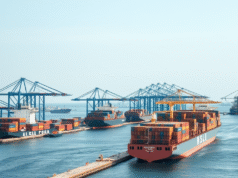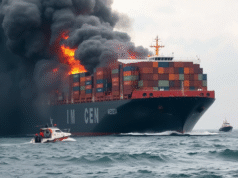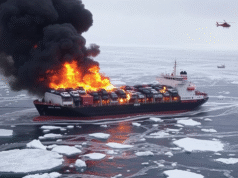Why Are the Houthis Blocking Ships at Israel’s Biggest Port?
According to Marine Insight On May 19, the Houthi group in Yemen said they are starting a naval blockade on Haifa, Israel’s largest port. This move is their response to Israel’s ongoing military actions in Gaza.
The Houthis warned that any ship heading to or linked with Haifa will now be seen as a potential target. This creates new worries for global shipping, especially in the Red Sea area.
What Sparked This Decision?
The announcement came after Israeli Prime Minister Benjamin Netanyahu said Israel would take full control of Gaza. In reaction, a Houthi military official said they are now officially adding Haifa port to their list of targets.
The Houthis claim this is their way of pushing back against what they call Israel’s increasing aggression in Gaza and also against the Yemeni people. They said they will stop these actions only when the war in Gaza ends and Israel lifts its blockade on the region.
A Long-Distance Blockade Begins
Another Houthi spokesperson said that the group has already started what they call a “long-distance naval blockade” on Haifa. This means ships are not allowed to load or unload anything at that port.
They warned that companies operating ships to or from Haifa could face serious consequences. These include sanctions, bans from entering major waters like the Red Sea, Bab al-Mandab Strait, Gulf of Aden, and even the Indian Ocean.
The blockade currently affects only Haifa. Other ports in Israel—like Ashdod and Eilat—have not been included so far.
Shipping Companies on High Alert
The Houthis stated that any shipping company sending vessels to Haifa—even indirectly—could face action. If a company ends up on their sanctions list, their entire fleet could be banned from several international waters. Worse, these fleets could be attacked wherever Houthi forces can reach them.
Even though the Houthis don’t have the military reach to enforce a blockade in the Eastern Mediterranean, they do control key waterways near Yemen. This is important because ships passing through the Suez Canal also move through these waters, putting them at risk.
Is the Threat Real?
The Houthis have already shown they can launch drone and missile strikes from Yemen. Despite U.S. airstrikes in March and April, they still have the power to target ships near their territory.
They’ve attacked ships in the past claiming they had ties to Israel. However, some of those ships didn’t actually have any confirmed connection to Israel. In fact, some were wrongly targeted and even linked to Houthi allies.
This confusion has made global shipping companies nervous. Many now fear that any ship could be labeled “Israeli-linked” and come under fire.
A Cycle of Ceasefires and Strikes
Earlier this year, the Houthis stopped attacks during a two-month ceasefire. But when Israel blocked aid to Gaza in March, the Houthis resumed their threats.
In return, the U.S. launched almost daily airstrikes starting mid-March, targeting areas where threats to ships might exist.
Although the U.S. and Houthis reached another ceasefire agreement this month, the group made it clear they will still act against Israel.
On May 16, Israeli airstrikes hit two ports under Houthi control. Afterward, Israel’s Defense Minister warned that if Houthi missile attacks continue, their leaders could face deadly consequences—just like Hamas leaders in Gaza.
Adapted for www.shiportrade.com.
News originally published by Marine Insight.








